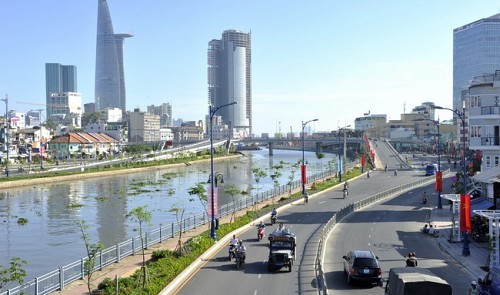(VOVworld) – The Government will submit a pilot project to build a new urban administration model for Ho Chi Minh City to the Party Politburo before sending it to the National Assembly for approval. It’s hoped the new administration model will fix current problems in urban management and development and generate momentum for Ho Chi Minh City’s development.
 |
| A corner of Ho Chi Minh city |
The Ho Chi Minh city People’s Council and People’s Committee under the present law have not clearly differentiated administration in urban and rural areas. Basically, the jurisdiction and organization of urban and rural administrations in Ho Chi Minh city are indistinguishable. The organization of the district and ward authorities is not appropriate to the task of managing an urban community.
Reform the organization to match development trends
The project will build a local administration model appropriate to the development and features of each locality whether developed and urbanized or rural. Ho Chi Minh city will split the People’s Council and People’s Committee into central and local levels.
Under the new model, the city will be re-organized as four satellite cities surrounding a central area comprising 13 districts. The 13 inner districts will have, not local administrations, but Administrative Committees under a centralized City administration.
The proposed apparatus has been simplified to ensure more effective administrative reform and avoid administrative overlap.
Nguyen Thi Quyet Tam, Vice Party Secretary and Chairwoman of the municipal People’s Council, said: “When people come to an administrative agency, their case will be resolved at once and will not be transferred to a higher administration. The City administration currently has three levels: ward, district, and city. Now the administration will have representative offices authorized to handle the cases.”
Ho Chi Minh city wants the government to decentralize control and responsibility in urban development. The satellite cities will have authorization for public financial management, planning, and investment, and handling administrative violation.
Nguyen Duy Thang, Deputy Minister of Home Affairs and Deputy Head of the National Steering Board on building the pilot urban administration model, said: “Decentralizing power will define duties of the central administration, the local administration, and those jointly managed by the central and local administrations, and the rights of the local administration in finance, state budget, economy, investment, culture, society, and national defense. Appropriate organization of the local administration will ensure what people want and what the administration must do.”
People’s interests considered ultimate
According to the project, the 13 inner districts will not have People’s Councils. The city has proposed that the government increase the number of People’s Council deputies from 95 to 200, one-third of them full-time deputies. The aim is to enhance the representative and supervisory role in the inner districts of the central People’s Council.